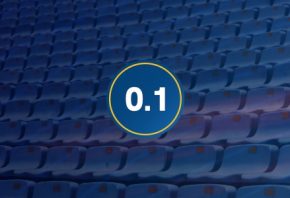Betting strategies are a dime a dozen in the world of sports betting. No matter how sharp or smart, every punter has their own system for investing their bankroll on sports such as the NFL, NBA, NHL, MLB and anything else listed by major sportsbooks. In this post, MyTopSportsbooks will introduce you to the concept of sports betting against the public, explaining what it means and how it works with the oddsmakers.
Who Is The Public?
Recreational gamblers, also referred to as the betting public, are considered casual sports bettors. Often, the casual bettor places bets without taking into account the underlying data. More often than not, the uninformed bettor will end up losing money. Many then opt to top-up their bankrolls as a result of unsuccessful bets, and the sportsbooks love them for it!

What Is ‘Betting Against the Public’?
When you bet against the public, you’re placing a bet against what the majority of bettors are betting on. Another way to refer to the strategy is ‘fading’ the public bettors. When gamblers bet, the majority of them bet on an outcome, and the most heavily bet outcome reflects what most people think the result will be. If you see one-sided betting which causes the lines to move, it means that most sports bettors are betting on one specific outcome. If you look hard enough across different sportsbooks, you can find lopsided sports events and then identify a value bet by betting on the other side. Betting against the public is an educated guess that the public is wrong more often than right, and visionary gamblers can see when the public has missed on a bet when the bookmakers post the odds.
Fading the Public: going against popular sports betting opinion.
Squares: casual sports bettors.
Sharps: experienced gamblers who make money from gambling strategies.
Action: a term to denote a bet
The Favorite: the likely winner of a game or match
The Underdog: the likely loser of a game or match
How it Works
A considerable number of bets can be wagered when betting against the public, and a sharp eye and perceptive wit will find them, bet on them, and take home the rewards. The side that holds the biggest cash stash on it is what public perception of the game’s outcome is. From a statistical standpoint, the public is off more often than it is on, so betting against the public is always worth considering.
You may find luck betting against the public in the following bets:
- Will a team win or lose?
- Will a game go into overtime?
- Will there be more than X number of points in a game?
- Will there be a red-card (in a sport like soccer, for example)?
Line Movement
In a perfect world, sportsbooks want an equal amount of money bet on both sides of the equation. They win on the losers and take vig from the winners to ensure fat profits. When betting becomes lopsided on one side of a game—think Kansas City Chiefs against anybody but the Buffalo Bills—and you get the idea. When you see the betting lines start to move, it should tell you that the public has tilted the scales and line movement – against the public – is one way to find betting balance.
What are the Factors That Influence Sports Betting Strategy
Many factors can shape popular opinion, and we look at some here
The Media
The dominant media narrative can sway bettors when they over-hype a team in a particular game or match.
Reputation
Teams like the Dallas Cowboys, Los Angeles Lakers and the New York Yankees enjoy great reputations and garner many sentimental/favorite team bets from the betting public.
Home Advantage
If the two teams are close in NFL betting, the home team is always a field goal favorite in football betting based on home-field advantage. It works the same in most sports, as the fan is always considered the 12th man in soccer or the 6th man in basketball or hockey.
Superstars
LeBron James, Connor McDavid, Patrick Mahomes, and Aaron Judge are all superstar players that strike fear in the opposition, and their place on the mantle of success will draw many sports wagering on the outcome. Why? Because they have the best player in the contest, but it doesn’t translate to winning bets without the help of the other players around them. Player props often garner a lot of attention based on superstar name recognition.
Psychology and Sports Betting
The public rarely, if ever, bets on low-scoring games. They like to bet on winning teams that score points by the boatload – betting against the public here can provide definite advantages when analyzing the competition heads up, and you bet on the opposite side.
Examples of Wagering Against the Public
Betting the Underdog to Win
Many people don’t know enough about the team they are betting on. The public will always drop a buck or two on the NY Yankees simply due to brand recognition. The same applies to big-name players such as Gerrit Cole, regardless of their form. Imagine the Yankees are playing the Blue Jays, and Cole comes into the game in terrible form. Thousands of dollars will still be bet on the Yankees and Cole simply because of who they are. In this example, the ‘sharps’ may have bet on the Blue Jays, whereas the ‘squares’ would have poured money into the Yankees.
Betting the Favorite Doesn’t Cover the Spread
The road dog with a big name will often grab the lion’s share of public money based on reputation. Imagine the Buffalo Bills go into Tennesee, where they are -7 favorites. The money lands on Tennessee, but the spread ends at three points, leaving many disappointed bettors. Because it wasn’t a risk-free bet for the matchup. If you play a parlay with the Browns, Steelers and Patriots, the betting percentages for the favorite teams will drive the public money when over 50 percent are betting with the parlay outlined.
Betting ATS
Imagine you are sizing up a Kansas City Chiefs vs. Buffalo Bills contest, and the Chiefs are -3 at home. You bet the Bills because you don’t think the Chiefs can cover, and the game goes down to the wire. The score ends 35-34, Chiefs; if you bet ATS, you have a winning betting slip. BetMGM will provide a promo code or bonus code to stimulate public action, and FanDuel will extend the same promo code or bonus code for regular season action.
Betting Over/Under
Over/Under betting is common in sports such as soccer and hockey. Imaging the line is set at 3.5. You bet the over, meaning you think there will be four goals or more in the game. In this case, if the game tied at 2-2 or one of the sides won 3-1, you would win. If you bet under 3.5, it means you think there will be three goals or less. The final score could be 3-0 or 0-0—either way, you would still win.
Moneyline Bets Against the Public
A Moneyline bet is a straight-up bet on a winner with the accompanying odds for a payout. When a casino or sportsbook is taking heavy action on one team, they will move the line to get money to move against the public and in general, it is usually a good bet because the public is wrong more than right.
NFL Betting or College Football Against the Public
NFL betting is one of the largest betting markets in the US. The high volume of players means that there are plenty of squares placing bets that are destined to lose. Two numbers to keep in mind here are 3 and 7. They have prominence because high-scoring games often end in a field goal – 3 points. Seven is prominent because a team down by a TD needs to score one to tie, and the team up a TD can run out the clock.
Baseball Betting Against the Public
In our example with the NYY, the Yankees will always take action based on star power from pitchers to hitters such as Gerrit Cole and Giancarlo Stanton. In this scenario, it doesn’t matter that Cole can’t locate the fastball, and Stanton is hitting .150 in the last ten games: squares will always back the Yankees. If you’ve done your homework, you’ll see that backing the underdog could be a clever way to build your bankroll.
Hockey Betting Against the Public
When betting on hockey or soccer—typically low-scoring affairs—the Moneyline is where you find the public money headed. Depending on the odds for betting on an NHL game, you can place three bets, lose two and still bank a profit depending on the odds. Moneyline bets pay better because underdogs get better odds than point-spread bets.








 Best Offshore Sportsbooks
Best Offshore Sportsbooks 